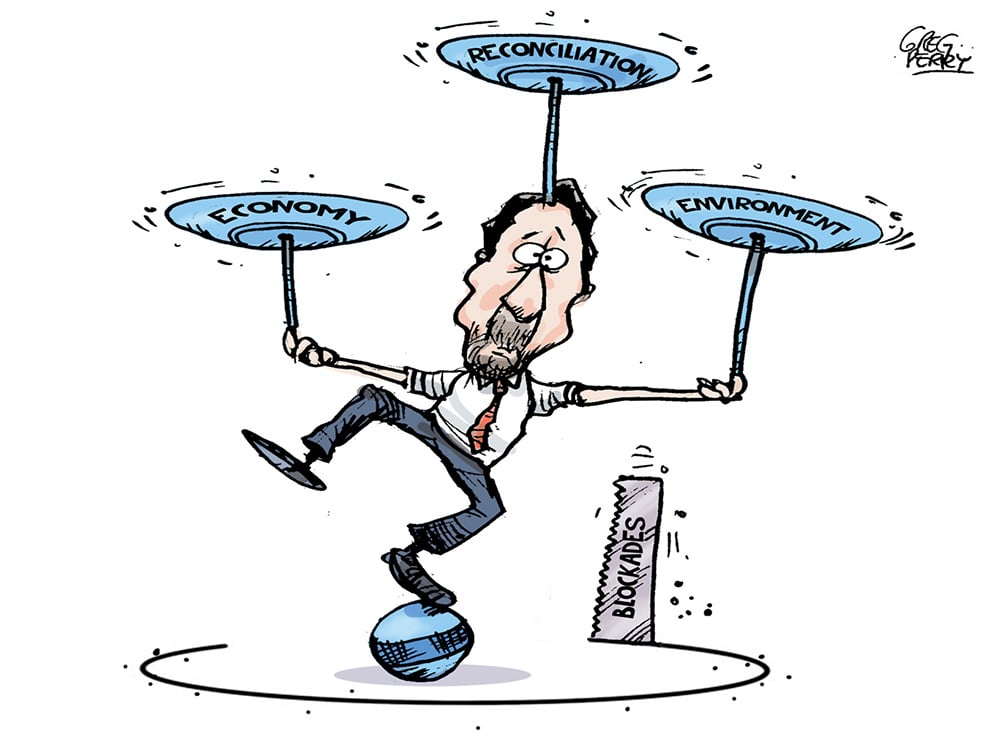Is the curtain coming down on the Justin Trudeau era in Canadian politics?
When the next election rolls around, both the Conservative and Green parties will have new leaders. Even NDP Leader Jagmeet Singh is newish.
No one should be surprised if the Liberal party follows suit. The case for dumping Justin Trudeau before the Liberals face the electorate again gets stronger by the day.
The federal government’s handling of the Wet’suwet’en protest against TC Energy Corp.’s Coastal GasLink project has been a month and more of Amateur Hour come to politics.
First, the prime minister ignored the crisis in favour of a foreign trip to promote a temporary seat for Canada on the UN Security Council. That made him look completely off rhythm.
When he finally did cut his travels short and returned to Canada, Trudeau claimed that protesters in violation of court injunctions were the problem of the B.C. government because it was responsible for enforcement and policing.
As Singh tweeted at the time, “pretending the federal government has no role is a failure of leadership.”
Although Trudeau advised patience in dealing with the Wet’suwet’en protests, a course far wiser than Conservative Leader Andrew Scheer’s shrill demand for frontier justice, the PM backed away from his own stand on Feb. 21, declaring that the blockades must come down.
No one on the Indigenous side listened, and the police were called in. That made the PM look hypocritical. Again, Singh skewered Trudeau, tweeting that it was heartbreaking to see “land defenders and Indigenous matriarchs dragged off their land.”
And when new blockades sprung up in places like Saskatoon and L’Isle Verte, as others were taken down in Ontario and Quebec, Trudeau simply exuded weakness.
The Wet’suwet’en and the Mohawk Warriors showed more resolve than the leader of the country, as they continued to defy the law — or from their perspective, to follow a higher one.
Irresponsible, hypocritical and weak are not the stuff of which leaders are made.
Trudeau has made himself chief juggler in a circus of incompetence. Already the damage to the Liberal government has been great.
The mortal sin of politics
At the height of the crisis, Via Rail Canada laid off 1,000 workers, and Canadian National Railway another 450.
Critical supplies of important items like propane dwindled to dangerously low levels in Eastern Canada.
As freight trains ground to a halt in front of solidarity blockades, Canadian ports saw a dramatic drop in landed cargo. Vessels diverted to more reliable ports in the U.S. They may or may not come back when rail service is fully restored in this country.
The rail disruptions have been so serious, and the backlogs created by them so great, that federal Transportation Minister Marc Garneau says it will be a long time before things get back to normal. In other words, when the barriers come down, the problem is far from over.
In his handling of this crisis, two weeks too late, Trudeau has committed the mortal sin of politics: he has made everyone unhappy. If in losing the last election, Scheer missed an open net on a breakaway, as Conservative leadership hopeful Peter MacKay quipped, the PM has scored on his own net in overtime.
Indigenous activists are disgusted by the PM’s flip-flop on the use of the police against them on their own territories. It is about as far as a politician can get from any known theory of reconciliation.
Nor has Trudeau’s failure to meet personally with the Wet’suwet’en Hereditary Chiefs created much confidence in his leadership. The swagger and spontaneity seem gone. Only the cynical political calculations remain.
Provincial premiers and business leaders are equally unhappy. They have criticized the PM for doing damage to the economy by not acting quickly and forcefully enough to get freight trains moving again.
For the official opposition, it has been the perfect opportunity to use the prime minister as a political piñata. Not only have his actions angered both protesters and business leaders, the polls show Canadians too are disenchanted with their prime minister.
In a recent DART Maru/Blue poll, 69 per cent of respondents agreed that “Canada is broken,” the country is headed in the wrong direction, and Trudeau is not governing well.
As for the standoff with Indigenous protesters, the poll found that just 27 per cent endorsed the PM’s course of action. By comparison, 36 per cent of respondents thought the hapless Scheer had done a good job.
With that kind of opening, political rivals pounced. Scheer claimed that the PM had actually “elevated” the crisis by his approach to it, that relying on protesters rather than police to take down the blockades early in the standoff was not leadership, but abdication.
Alberta Premier Jason Kenney used the crisis to drum up support for his kneejerk Critical Infrastructure Defence Act, aimed at what the premier described as “green, left militants” who do things like blockade railways. That will soon be a crime in Alberta with serious consequences.
Kenney seems to be echoing former Conservative public safety minister Vic Toews, who put opponents of Enbridge’s Northern Gateway pipeline in the same category as terrorists. Kenney also blamed Trudeau for driving investment away by creating the appearance of “anarchy” in Canada.
Despite the string of stumbles and bumbles, there was still a chance for the PM to recover. If he could negotiate a settlement to the crisis, what would otherwise be seen as feckless dithering might be turned into statesmanship. Again, the federal government faceplanted.
What’s been ‘arranged’?
Consider the murky, March 1 “arrangement” with the Wet’suwet’en Hereditary Chiefs aimed at defusing a bitter dispute over the construction of the 670-kilometre Coastal GasLink pipeline through that nation’s traditional territory.
All Canadians have been told is that a proposal has been made by the federal government and the provincial government of British Columbia that the Hereditary Chiefs will now take back to their people. That proposal in part is to recognize Wet’suwet’en land ownership of 22,000 square kilometres of unceded territory in northwestern B.C. As for the full Monty on the deal, Trudeau says he will leave the release of details to the discretion of the Wet’suwet’en.
Crown-Indigenous Relations Minister Carolyn Bennett has made clear that the federal government offered recognition of land title without asking for anything in return.
No wonder.
The Supreme Court of Canada confirmed Wet’suwet’en title to traditional lands and waters 23 years earlier in the landmark case of Delgamuukw v. British Columbia. Back then, the issue was clear-cutting forests on the traditional territory of the Wet’suwet’en. Though today it is about pipelines, the collision between government and First Nations remains inextricably linked to the environment.
It is true that the Supreme Court didn’t cross every “T” and dot every “I” of that landmark ruling. But the only thing new in this so-called “breakthrough” agreement after talks in Smithers, B.C., is the prospect of an endless round of implementation talks around the 1997 decision — in other words, a classic example of governments ragging the puck.
Nor has there been any mention, at least publicly, about how this agreement would deal with other First Nations with overlapping claims on the same territory as the Wet’suwet’en.
So far, there is no good reason to believe this deal will ultimately be embraced by the Wet’suwet’en Nation in two weeks or so. That’s because the negotiations failed at three critical levels.
First, the proposal does not deal with the issue of the Coastal GasLink pipeline itself. In fact, the position of both parties remains unchanged. The governments insist the project will go forward; the Wet’suwet’en Hereditary Chiefs continue to oppose it. Since government negotiators have made clear that any agreement will not be retroactive, further protests appear inevitable.
Nor has the policing issue been dealt with. The Wet’suwet’en wanted the RCMP completely out of their territory. Instead, the force closed their outpost, euphemistically known as the Community Industry Safety Office. It moved its 20 officers to a detachment in nearby Houston, B.C.
But RCMP patrols of the Morice West Forest Service Road, inside Wet’suwet’en territory, were set to continue after negotiations ended. Since the Wet’suwet’en have said that out means out, it is hard to imagine how they will be satisfied with a continued RCMP presence on their territory. They are still under surveillance.
Finally, the Wet’suwet’en wanted all workers on the Coastal GasLink project off their traditional lands. Instead, work was scheduled to resume on the project after the draft agreement was reached by Chief Woos for the Wet’suwet’en, and ministers Carolyn Bennett and her provincial counterpart, Scott Fraser, for the governments involved.
PM as expanding target
Why does all of this matter?
With all the big issues outstanding, it is difficult to see a long-lasting solution coming out of the Smithers negotiations. That is ominous. As Douglas Porter, the chief economist of the Bank of Montreal told the Financial Post, the last month of painful disruption to the economy from the blockade will have long-term damage if it was not a one-off.
Protests sparked by the Coastal GasLink project are not the only white water Trudeau is facing. When work begins in earnest on twinning the Trans Mountain pipeline, that project too is certain to meet with vigorous protests.
What those potential protesters have learned from the Wet’suwet’en is that crisis democracy works, as writer Robert Jago of the Kwantlen First Nation and the Nooksack tribe recently told The Tyee. Standing up to this government on matters of principle, rights and constitutional law, gets the attention of the big boys.
Since the PM made the dubious move of buying TMX, he will have little option but to force it through, even as the price-tag for construction spirals out of control toward the $12-billion mark. That will leave Trudeau looking like a reactionary colonialist to the Indigenous community and a faux-environmentalist to all those people who once embraced the star of the Paris climate talks as their champion.
In other words, B.C. could easily end up being Trudeau’s political Waterloo, the place where his words and deeds no longer align.
When you add in the cancellation by Teck Resources Ltd. of its $20-billion Frontier Mine project, and the lingering bad taste left by the PM’s unethical performance during the SNC-Lavalin scandal, it is easy to see how Trudeau will be targeted by his political opponents: He will be painted as the leader who is all image and no substance, who says one thing and does another, who wants to have it both ways on all issues, but usually delivers to the corporate side.
At the deepest level, it comes down to the perils of charisma politics. A charismatic leader is like a shot of adrenalin, as Trudeau proved in 2015, when he took the third party in Parliament all the way to a majority government.
At the time, former federal environment minister and B.C. MP, David Anderson, told me that when a political party places its bet on leader star-power, it is a two-edged sword. They can lift a party up in a big hurry, but they can also bring it down even faster. Again, Trudeau proved that in 2019, losing his majority government to an inept contender.
It will take more than a beard to hide the brewing leadership problem faced by the Liberals. ![]()
Read more: Indigenous, Energy, Rights + Justice, Federal Politics
















Tyee Commenting Guidelines
Comments that violate guidelines risk being deleted, and violations may result in a temporary or permanent user ban. Maintain the spirit of good conversation to stay in the discussion.
*Please note The Tyee is not a forum for spreading misinformation about COVID-19, denying its existence or minimizing its risk to public health.
Do:
Do not: